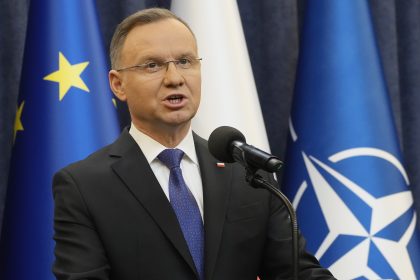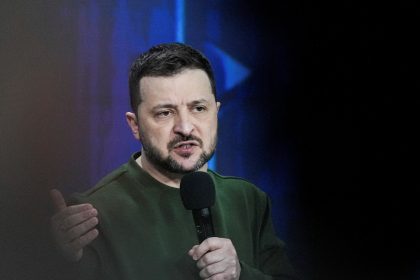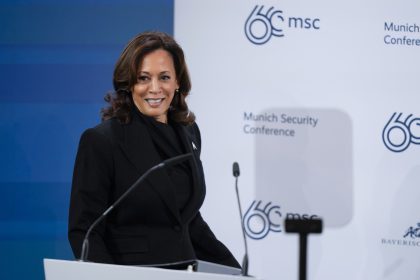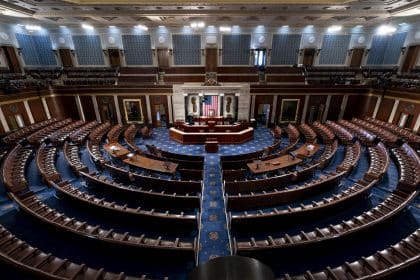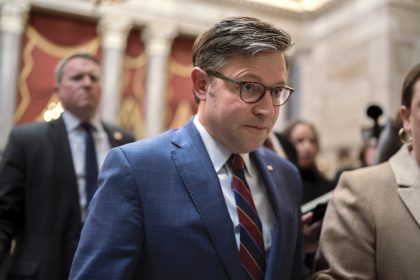George Shultz Wasn’t ‘Afraid to Struggle Against the Odds’
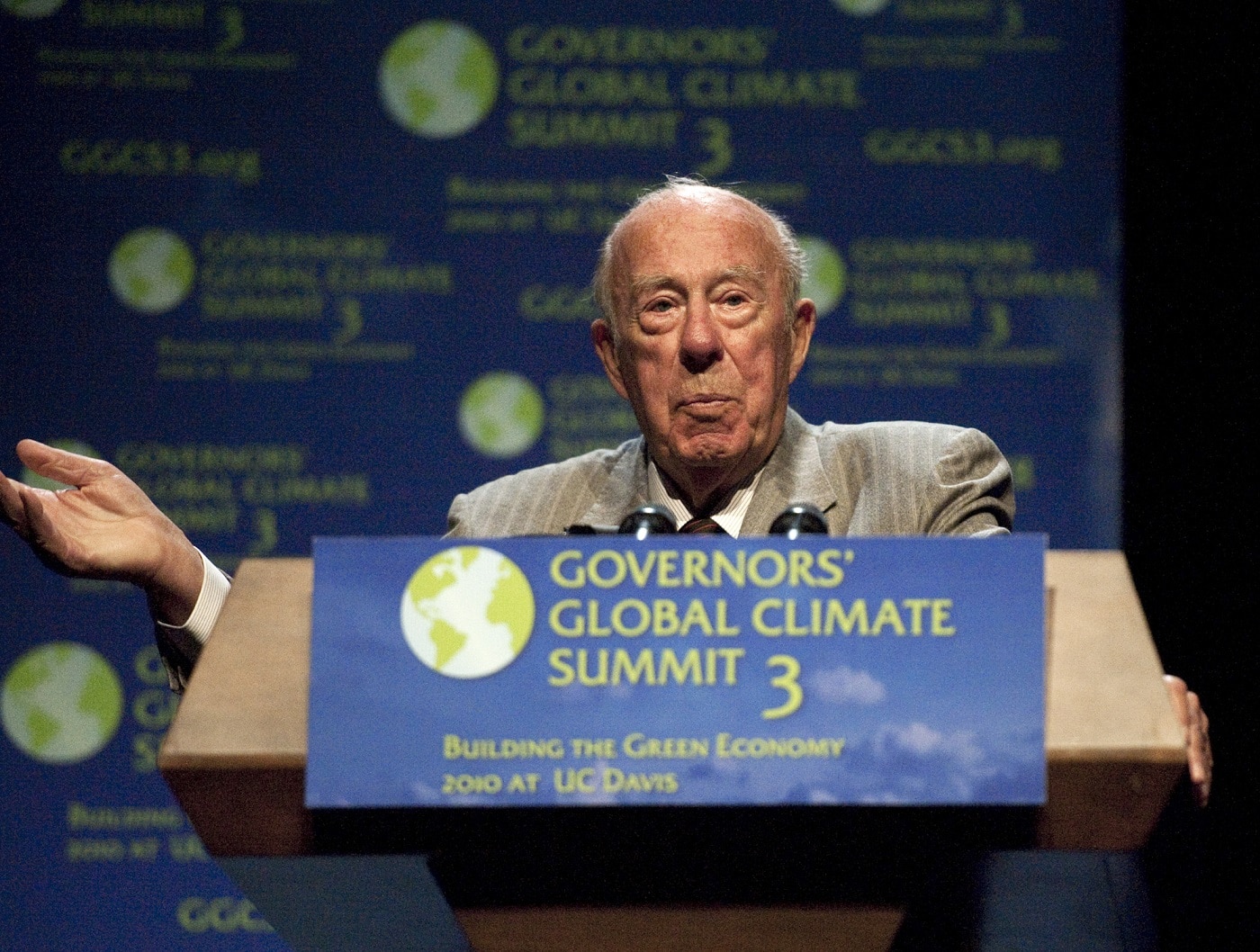
WASHINGTON (AP) — Time was running out when Secretary of State George P. Shultz returned home in April 1988 after flying 16,000 miles in a failed mission to persuade Arabs and Israelis to negotiate their differences. Shultz said he would keep trying.
“Who’s afraid to struggle against odds?” he asked.
And so he did, in futility, until the Reagan administration ended in January 1989 without putting the Palestine Liberation Organization and Israel on a course to a settlement.
But he shaped the future by legitimizing the Palestinian Arabs as a people with a defensible stake in determining their future.
Shultz, who died Saturday at age 100, was one of America’s most respected 20th-century statesmen. He served in President Richard M. Nixon’s Cabinet as secretary of labor and as secretary of treasury and then pursued accommodation with an evolving Soviet Union as President Ronald Reagan’s top diplomat for 6½ years.
A lifelong Republican, Shultz negotiated the first-ever treaty with the Soviet Union to reduce the size of their ground-based nuclear arsenals. The 1987 accord was a historic attempt to begin to reverse the nuclear arms race, a goal he never abandoned in private life.
“Now that we know so much about these weapons and their power,” Shultz said in an interview in 2008, “they’re almost weapons that we wouldn’t use, so I think we would be better off without them.”
A year earlier, in 1986, a U.S.-Soviet summit in Iceland had collapsed in spite of his hopes that the superpowers could ban much of their nuclear arsenals.
Soviet leader Mikhail Gorbachev sought to limit Reagan’s cherished Strategic Defense program, known as Star Wars, to research. The president would not yield, and Reagan and Shultz returned to the United States disappointed but determined to pursue an accord.
Former Secretary of State Henry A. Kissinger, reflecting in his memoirs on the “highly analytic, calm and unselfish Shultz,” paid him an exceptional compliment in his diary: “If I could choose one American to whom I would entrust the nation’s fate in a crisis, it would be George Shultz.”
Throughout his career, Shultz was admired for loyalty, pragmatism and levelheadedness. He was called “the Sphinx” for his ability to be affable and seemingly open while giving nothing away.
Shultz enjoyed an instant, easy rapport with Reagan. But a rare public disagreement came in 1985 when the president ordered thousands of government employees with access to highly classified information to take a “lie detector” test as a way to plug leaks of information.
At the time Shultz told reporters, “The minute in this government that I am not trusted is the day that I leave.” The administration soon backed off the demand.
A more serious disagreement was the secret arms sales to Iran in 1985 in hopes of securing the release of American hostages held in Lebanon by Hezbollah terrorists.
Although Shultz objected, Reagan went ahead with the deal and millions of dollars from Iran went to right-wing Contra guerrillas in Nicaragua. The ensuing Iran-Contra scandal swamped the administration.
“The arms transfer could not be justified,” Shultz later wrote. “I could not support this program in public, and I would not acquiesce with its continuation.”
Shultz’ reputation for decency and patriotism stood firm while the Nixon and Reagan administrations were scarred by Watergate and the Iran-contra scandals. And, by all accounts, he was a considerate boss.
“Thanks for the Memory,” was written on the gigantic cake the Air Force stewards served him on his final flight as secretary of state.
Over 6½ years, he covered 880,941 miles and arranged breaks in his diplomatic duties to pay tribute to the culture of the people and places he visited.
“I think the thing I felt the best about had to do with the area of human rights,” he said. On his trips to Moscow he spent time meeting with Jews and other dissidents who were denied exit permits to Israel and elsewhere. He arranged a Passover seder at the U.S. Embassy and made sure “refuseniks” were invited.
When he pledged to keep trying to promote peace talks in the Middle East, his desk was piled high with summit planning, turmoil in Panama and completing an agreement for the withdrawal of the Red Army from Afghanistan. He plotted carefully.
Yasser Arafat, the Palestinian leader, had memorized the line demanded by the United States and renounced terrorism, while hard-line Israeli Prime Minister Yitzhak Shamir had agreed to the principle of exchanging land for peace. But Shultz, like a long line of U.S. mediators, secretaries of state and U.S. presidents, could not get serious peacemaking on track.
“I failed,” he said on the U.S. plane taking him home.
As it would turn out, though, the Palestinians edged their way toward statehood and Israeli withdrawal from lands surrendered by the Arabs in the 1967 Mideast war. And Shultz, as much as anyone, set the stage.
Andrew Young had lost his job in 1979 as U.S. ambassador to the United Nations for unauthorized meetings with Palestinian diplomats. But only a few years later, Reagan and Shultz, considered Israel’s best friends, had opened the door to Palestinian legitimacy and possibly a Palestinian state on land held by Israel.
Shultz liberalized the rules for the briefings that secretaries of state gave to reporters traveling with him. He could be identified by name, not shrouded in partial secrecy as “a senior U.S. official.” He assured reporters, “I have nothing to hide.”
The late AP Diplomatic Writer Barry Schweid contributed to this report.


















